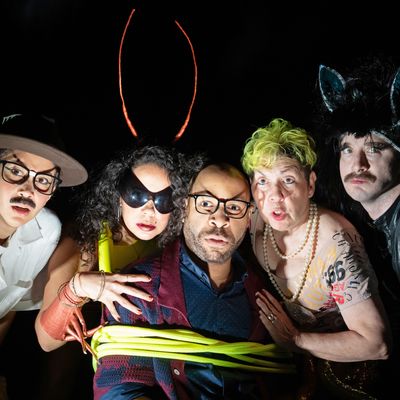
Soho Rep has been playing its imminent departure from the downtown black box fondly known as Walkerspace very cool. Yes, the venue is tiny; it lacks disabled access; it’s got water damage and old plumbing and too little electricity to run the AC during tech rehearsals. And yes, Soho Rep’s leadership team, as well as the folks at Playwrights Horizons—where the Rep is about to bunk up for at least two years—are genuinely excited about their upcoming partnership.
“Are there ways both our organizations can learn from each other?” Caleb Hammons, one of the Rep’s artistic leadership trio, has asked, while Playwrights’ artistic director Adam Greenfield believes the collaboration will reveal “that two theaters working together are much greater than the sum of their parts.” It is exciting, though it never would have happened if Walkerspace’s old landlord hadn’t died and the building hadn’t been acquired by yet another city-devouring developer. Kind of like how the Connelly—one of the most beautiful old theaters in the East Village, with some of the most consistently compelling programming—wouldn’t be shut down and futureless if its landlord, the Roman Catholic Archdiocese of New York, hadn’t started screening the scripts a little more closely and decided that these dangerous deviant plays won’t do.
What—in theater and everywhere else—are we to do as the bulldozers of avarice and bigotry roll on? The truth is that we really don’t have a choice about whether or not to move toward a new era of mutual aid — of, theatrically speaking, co-production, space- and resource-sharing, and institutional collaboration and cross-pollination. The line between ethical imperative and basic survival strategy has long since been chipped away. It’s time to invite the village in and start making stone soup.
Perhaps it’s because of its tricksterish awareness of the perilous, possibility-rich state of things—coupled with its unabashed playfulness—that Give Me Carmelita Tropicana! feels like the perfect farewell-and-godspeed to Soho Rep as we know it. The show is a trippy love letter, the kind of wily, ingenious, slightly unhinged delight that pulls back the curtain on what theater really is: simultaneously a silly game and an inherently political act in which a bunch of kids, some young, some old, try on personas like feather boas, making shit up, making a mess, making worlds. Pulling back several curtains, actually.
Mimi Lien and Tatiana Kahvegian’s cardboard-and-tinsel-happy set is a gleeful box of surprises, revealing layer after hidden layer of madcap mental landscape. “Phantasmagoria” is the show’s chosen word for it, a term that’s expounded upon at length in one of the play’s funniest sequences by a maniacal goldfish puppet. But I’m getting ahead of myself.
To quote Branden, the onstage avatar for Branden Jacobs-Jenkins, who co-wrote the play with the performance artist Alina Troyano , often known as her stage persona Carmelita Tropicana: “You’re probably asking yourself, ‘What’s this play about?’” Well, put as simply as possible, it’s about two artists, one the “former star student” of the other, and the Wonderland–style adventure they’re sucked into when the student offers to buy the teacher’s alter ego. “Oh God, B. I’m in such a mess,” says Troyano, the teacher, playing her offstage self and muttering over the phone to Branden (embodied with flawless comic precision by Ugo Chukwu) on a dark and stormy night.
“I’m scared I have to do something drastic soon ...
I think ...
I think I’m going to have to kill her.” Cue thunder! Cue lightning! Jacobs-Jenkins—who loves the Gothic, not to mention the slippery business of representing oneself onstage —is clearly having a blast. In collaborating with Troyano, he’s getting an extra infusion of “screw it, let’s do it” exuberance, a push to embrace the big, delicious, unsophisticated impulse, and it feels great and freeing.
When that’s chucked in a blender with his own penchant for spiky-savvy verbosity, the results fizz and pop. “Hadn’t I been her mostly loyal star pupil all these years?” demands Chukwu’s Branden, whose self-satirizing preening is tuned at just the right frequency. “Devoted to the care of the very soil from which she herself had not only sprouted but through her life and work also tilled with such wit and sacrifice, and by that I mean the ontology of intersectional ‘minority’ urban American life in the latter half of the 20th century as expressed through the professional identity of the ‘gigging creative’ jargon jargon jargon theory theory theory?” Chukwu pirouettes through this kind of winkingly pompous spiel with agility and verve.
Part of what makes his Branden so funny is his anxious desire—that of the comparatively successful, socially conscious millennial—that we be impressed with him but not alienated. “Guys, I’m not rich,” he insists to the audience, feebly and hilariously, after Alina has implied otherwise. Alina could be forgiven for the mistake.
After all, Branden’s response, when he hears that his mentor is thinking of killing (or perhaps “retiring”) Carmelita Tropicana, sounds like that of an eccentric millionaire. “Don’t kill her,” he says. “Give her to me.
I want her ...
Or, wait, I could buy her from you? You could sell her to me ...
How much do you want?” Carmelita Tropicana—the brassy, banana-wearing lesbian chanteuse from Havana who lives inside Alina Troyano—is suddenly a tradable commodity. But a whole rabbit hole’s worth of shenanigans are about to unfold as Branden starts to discover just how much more she is. A few surreal turns later, Carmelita has entered Branden’s body, and Chukwu—conjuring up Steve Martin as possessed by Lily Tomlin in All of Me —is caught debating himself.
“I guess I just didn’t ...
I didn’t understand that there was this whole other metaphysical element to it,” his Branden side falters. “I just thought we were talking about ..
. you know ..
. IP?” It’s a great line — the kind that’s funny because it’s a cleaver, with both edge and weight to it. Give Me Carmelita Tropicana! is often zany but never mindless.
If it’s got something to say—inside the farcical, fantastical twists and tumbles, which are all fully digestible in their own right as pure, liberating fun—it’s that our insistence on a world in which everything is for purchase is wreaking havoc not only on our environment, our politics, our social conscience, but also and most crucially on our imagination, which is the place where any change, any alternative vision, truly begins. How such a vision comes to life—at least according to Jacobs-Jenkins and Troyano, along with director Eric Ting, who gamely leans into the bizarre—is through a theater of wit and wackiness, collage and surprise and accumulation — something less like settling in to listen to a straightforward narrative than like rifling through the attic of a wild great-aunt. Ooh, look! A photo of her at the WOW Café in the ’80s.
Another where she’s playing a ...
sexy cockroach? And over here — a feathered turban, a “bejeweled brassiere”! Together, Branden and Alina stumble through Phantasmagoria, the mind-maze that houses all Alina’s personas and creations — including the cigar-smoking bus driver and self-appointed poet of Cuban manhood, Pingalito (Troyano at first, then the excellent Octavia Chavez-Richmond), and, yes, that sexy cockroach. Her name is Martina (Keren Lugo, who also plays a very funny lawyer called Dede), and she’s married to a mouse, though there’s a mournful, histrionic horse called Arriero (the absolute gem Will Dagger) pining for her. Long-maned and leather-clad, with fluttering eyelashes and a constant pout beneath his mustache, Arriero looks like he’s ready for a night out in the Meatpacking District.
Greg Corbino—who brought to life the fabulous vulva-scape of Soho Rep’s Snatch Adams and Tainty McCracken last year—designed the show’s costumes and, more strikingly still, its puppets. Dagger also plays ever-expanding iterations of the goldfish (its origin can be traced back to a performance-art piece young Branden did in Alina’s class at NYU), and both his wonderfully demented performance and Corbino’s incredible creations touch something beyond the simply daffy. There’s a weird beauty here too, even something fearsome.
If I tell you that our heroes eventually end up singing Spice Girls karaoke with Maria Irene Fornés (Chavez-Richmond) and a jorts wearing Walt Whitman (Dagger) while a surly, vaguely horny Juana Inés de la Cruz (Lugo) looks on, is that a spoiler? I hope it’s an enticement. Give Me Carmelita Tropicana! joyously follows Walt’s advice—“Have you tried containing multitudes?” he titters at Alina and Branden—revealing the kind of intellectual and spiritual center that’s inherent in humor and curiosity, in the genuine pursuit of delight. Though the writers encourage us not to cling too desperately to questions of meaning—“There was a time in my theatergoing life where I didn’t go to plays because I needed them to be ‘about’ anything,” Chukwu’s Branden ruminates—that stance is also a bit of sleight of hand: Look over here! At the cockroach, at the gargantuan goldfish, at the one and only Carmelita Tropicana! We do look, and laugh, and ride the ride — and through those portals, a bold proposal slips in.
What if more plays were this playful? What if, like Fornes, we turned to possibility rather than to formula? “I don’t know,” squeaks Martina the cockroach, trapped at one point in the body of Dede the lawyer, outside of her native Phantasmagoria and inside the only part of Lien and Kahvegian’s set that resembles that of a realistic, office-set drama. “I kind of hate it here. It’s so beige and unfree.
” So, says Carmelita Tropicana , imagine something else. Give Me Carmelita Tropicana! is at Soho Rep through December 15. Already a subscriber? Sign in By submitting your email, you agree to our Terms and Privacy Notice and to receive email correspondence from us.
.














